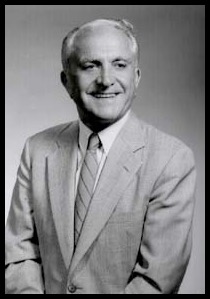In Memory of Comm./Chmn. James Quello
26 01, 10 08:14

James H. Quello, former commissioner (1974-1997) and chairman of the Federal
Communications Commission (1993), passed away on Jan. 24 at the age of 95 in Alexandria (FCC bio MSU Quello Center bio). Chmn. Genachowski issued a statement saying
It was with great sadness that I learned of the death of former Commissioner Jim Quello. Jim was a friend and a beloved Commissioner of this agency for more than two decades. Known as the 'Dean' of the FCC -- and 'Boss' to the many staffers who worked for him -- he was a role model to generations of FCC employees and advocates for his decency, personal charm, and commitment to his work. He leaves behind an extraordinary legacy of service to the FCC, the communications industry, and the American people.
I would like also to say how much I respected Chmn. Quello by describing two incidents that show his character.
1) As I have described elsewhere, my “reward” for persevering and getting the spread spectrum/ISM band rules (now 15.247 and the basis for Wi-Fi, Bluetooth, ZigBee, and a host of other products) adopted in 25 years ago, was to get caught up in a “bloodbath” in OET’s predecessor organization which attempted to dismiss Chief Scientist Robert Powers, his deputy Margaret “Peggy” Reed (now Greene), and myself a few months later in the Fall of 1985. There is some uncertainty about precisely why this happened, but it was the first FCC reduction in force (RIF) in 10 years, it affected only 3 people, and there would not be another one for another 10 years.
At that time, Comm. Quello was the longest sitting commissioner, and like the other long term commissioner, the beloved Robert E. Lee, he took a special interest in the FCC staff and its welfare. Thus in the fall of 1985, he was the only FCC commissioner who would agree to meet with me to discuss my situation. He listened carefully and then gave me good fatherly advice on how to move on and make the best of the situation. I will always remember the time he spent with me and his kind words at the time - they were very helpful in recovering from this traumatic event and getting on with my career.
2) I have also described elsewhere how I got FCC to take initiative in the 60 GHz area in the early 1990s. Yesterday I received the January 2010 issue of IEEE Microwave Magazine and the “focused issue feature” is an article on “Siliconization of 60 GHz”. This article focuses on the growing commercial use of this band in both home and office environments. So what does this have to do with James Quello?
Unlike the case of Wi-Fi’s origins, the internal FCC controversy over 60 GHz was at the initialization stage, not the rule adoption stage and that happened during the Quello chairmanship. I never interacted directly with Chmn. Quello over this issue, but as an excellent manager he selected talented assistants and let them do their job. In this case his outstanding chief of staff, Brian Fontes, readily agreed to hear my proposals for initiating a 60 GHz rulemaking along with the concerns of those responsible for such rulemakings who opposed any initiative. Within a few days, I got the go ahead from Quello’s office to start the rulemaking. Did Chmn. Quello get personally involved, or was it just that he chose the right staff and trusted them - I do not know. But as we see more and more 60 GHz commercial products, maybe we should think of this as the “Quello band”. (An example of a 60 GHz HDMI link for home use.)

The James H. and Mary B. Quello Center for Telecommunication Management & Law at Michigan State University, their alma mater, is a fitting memorial to this great man. He will be missed.
blog comments powered by Disqus



![Validate my RSS feed [Valid RSS]](valid-rss-rogers.png)

